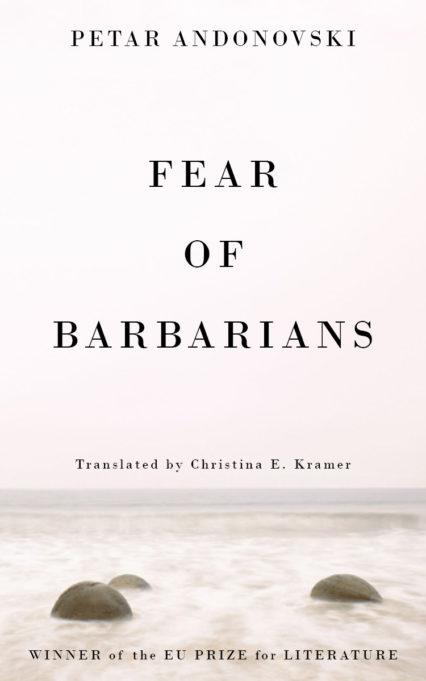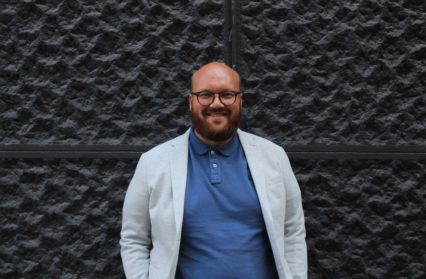Kate Waldock interviews Petar Andonovski about his newly-translated novel, the award-winning Fear of Barbarians.
Kate Waldock: What drew you to writing this tale, Fear of Barbarians?
Petar Andonovski: The subject of barbarity holds a long tradition in literature. In Homer’s Iliad the word barbarians is mentioned for the first time, and it has sustained for so long that we see it in Cavafy’s poem Waiting for the Barbarians and further on in J. M. Coetzee’s novel with the same title.
Who is actually a barbarian and who is civilized? Aren’t there barbarians hiding among the civilized ones? What we are afraid of, exactly? These are the questions that went through my mind as I was writing the novel. And no matter how much is being written on this subject, a new question always arises on this matter. The relation between civilization and barbarity is equal to the relation between the good and the evil. No matter how often these two are written about, they always remain provocative.
 Can you tell me a bit about the history behind the book, and the real characters it was inspired by?
Can you tell me a bit about the history behind the book, and the real characters it was inspired by?
Petar Andonovski: Everything started one winter morning when I was on Crete. The same day on which I was woken by a strong earthquake, was the first time I heard of Gavdos. I was haunted by its name for days. I knew nothing about it, but I knew that ultimately I would write something about this little island. The only information I was given by the local people in Crete was that there is nothing but stones on that island. And then, unexpectedly (although I don’t believe in coincidence) I saw an article on the internet about the forgotten island with a population of only fifty, and Russian settlers who were there only to cure themselves from the radiation of Chernobyl. At that moment I saw the stones, the fifty inhabitants, Chernobyl and the Russians. This is a novel, I thought.
Tell me about your decision to write the narrative of two women?
Petar Andonovski: All of my novels are about women, not just this one. Even more so, my latest novel, which is a queer novel with gay men as characters, is filled with plenty of women. I find women closer to me than men; I understand them better.
I grew up with women. I grew up with my mother, my sister and my two grandmothers. Our home was always full of women of every age. In my childhood vocabulary you can’t find words like pliers, screwdriver, carburettor, etc. In my childhood world, women traditionally drank Turkish coffee and nurtured the art of fortune-telling; they interpreted their dreams, silently chatted about marital problems and kept silent about forbidden loves. In my childhood vocabulary you can hear a lot about georgette, spandex, silk, hair rollers, perms, broken high heels, ripped tights and forty pieces of Baklava made in a 9×13-inch metal pan.
What drove you to discuss, within this novel, the limitations imposed on women through marriage constructs and sexist societal structures?
Petar Andonovski: Balkan women formally enjoy the same rights as men, but it’s quite different in reality. Especially in smaller towns, women literally have no voice in our society. They are brought up by their families and taught in schools that submission is a natural thing for women, so many of them accept the silence as destiny, unaware that destiny is a matter of personal choice and that they can change it. These are the women that I want to write about. Through my writing I want to give them a voice. My writing is my fight against silence.
What do you feel is the importance of the lemon tree?
Petar Andonovski: My parents lived on Crete. I have spent all of my summer and winter holidays on the sea shore. There I became a man and a writer. The Mediterranean – with all its seas, islands, seashells, oleanders and lemon trees – is deeply rooted in my literary identity.
What is the significance of using names that call to mind Greek mythology in Penelope’s story?
Petar Andonovski: In the novel you can see two entangled stories about two women. One is the story of the Russian woman Oksana, and the other is the story of the Greek woman Penelope. Besides the well-known metaphor regarding the meaning of the Greek name Penelope – the explicit allusion of Penelope in Homer’s Odyssey – it is less known that the name Oksana, beside the Slavic (Ukrainian) origin (meaning ‘in praise of God’) has a meaning in Greek too, signifying ‘foreigner’, but also ‘hospitable’ (from Greek xenos = foreigner/guest), which also has metaphorical connotations in the context of the novel.
Why did you decide on the title ‘Fear of Barbarians?’
Petar Andonovski: While I was writing the novel, I kept returning to Cavafy’s poem Waiting for the Barbarians. Firstly, I wanted my novel to have Cavafy’s poem title, but as the story developed, the title Fear of Barbarians imposed itself more and more in my mind. The subject of fear pervades the novel: the fear of foreigners, the fear of the unknown, the fear of the past, the fear of one’s own wishes and the fear of freedom… And all of these feelings and thoughts are caused by them: the barbarians. All of the characters in Fear of Barbarians actually face themselves when the face the foreigners. The foreigners are their alter ego. We are all foreigners in our own life; we are all barbarians to ourselves.
In terms of the writing and structure, did you find it difficult to switch between two characters’ narrative style and personality?
Petar Andonovski: This was not my first time writing from a position of two characters. In my first novel, Eyes the Color of Shoes, the story is told in two stories. The first part of the story speaks of Emma, a middle-aged literature professor with an obsession for clean male shoes; she follows shoe owners without any intention to approach them or to threaten their everyday life. The second part of the novel tells the story of a randomly followed man. His name is Nestor, a once popular writer. His debutant novel was misread and declared to be an anti-state novel in the communist system. So, he was imprisoned for 8 years. When Emma starts following him, he immediately becomes paranoid and remembers the secret services.
In Fear of Barbarians I also wanted to tell the story from two perspectives. I wanted the story to be told from both sides, from the side of ‘the civilized’ and from the side of ‘the barbarians’. I wanted this so that the reader can constantly ask, ‘who is actually the barbarian?’
Fear of Barbarians is available to order from Parthian Books.
You may also like… Manon Steffan Ros in Conversation
Gary Raymond caught up with the author Manon Steffan Ros, who is arguably the most successful novelist writing in Welsh at the moment.












